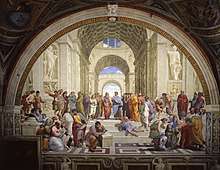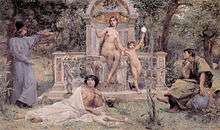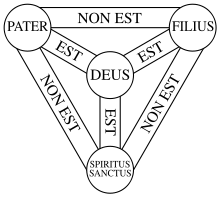
It is certainly no part of religion to compel religion.
Quintus Septimius Florens Tertullianus (c. 155 – c. 240) was a theologian in the early Christian church, known for his powerful denunciations of many influences he considered heretical, including the widespread admiration of pagan philosophers and Gnostic ideas. Later in life Tertullian defended Montanism, a belief that was later declared heretical.
Quotes
Truth does not blush.

You can judge the quality of their faith from the way they behave. Discipline is an index to doctrine.
- Omnium gentium unus homo, uarium nomen est, una anima, uaria uox, unus spiritus, uarius sonus, propria cuique genti loquella, sed loquellae materia communis.
- Veritas autem docendo persuadet non suadendo docet.
- Nihil veritas erubescit
- Truth does not blush.
- Adversus Valentinianos, 3.2
- Truth does not blush.
- Prorsus credibile est, quia ineptum est.
- It is to be believed because it is absurd.
- Variant translations
- It is by all means to be believed, because it is absurd.
- It is is entirely credible, because it is inept.
- It is certain because it is impossible.
- De Carne Christi 5.4
- Often paraphrased or misquoted as "Credo quia absurdum."
- Also paraphrased as "It is so extraordinary that it must be true."
- Two lines from De Carne Christi have often become conflated into the statement: "Credo quia impossibile" (I believe it because it is impossible), which can be perceived as a distortion of the actual arguments that Tertullian was making.
- De calcaria in carbonarium.
- Out of the frying pan into the fire.
- De Carne Christi, 6; "The Roman version of the proverb is more literally translated "Out of the lime-kiln into the coal-furnace."
- Out of the frying pan into the fire.
- Omnia periclitabuntur aliter accipi quam sunt, et amittere quod sunt dum aliter accipiuntur, si aliter quam sunt cognominantur. Fides nominum salus est proprietatum.
- All things will be in danger of being taken in a sense different from their own proper sense, and, whilst taken in that different sense, of losing their proper one, if they are called by a name which differs from their natural designation. Fidelity in names secures the safe appreciation of properties.
- De Carne Christi, 13.2
- All things will be in danger of being taken in a sense different from their own proper sense, and, whilst taken in that different sense, of losing their proper one, if they are called by a name which differs from their natural designation. Fidelity in names secures the safe appreciation of properties.
- Why lean upon a blind guide, if you have eyes of your own? Why be clothed by one who is naked, if you have put on Christ? Why use the shield of another, when the apostle gives you armour of your own? It would be better for him to learn from you to acknowledge the resurrection of the flesh, than for you from him to deny it; because if Christians must needs deny it, it would be sufficient if they did so from their own knowledge, without any instruction from the ignorant multitude.
- De Resurrectione Carnis [Of the Resurrection of Flesh] Ch.1 as quoted in The Writings of Tertullian, Vol.2 Tr. Peter Holmes, as contained in Ante-Nicene Christian Library: Translations of the Writings of the Fathers down to AD 325 Vol.15 (1870)
- Qui fugiebat, rursus sibi proeliabitur.
- He who flees will fight again.
- De Fuga in Persecutione, 10
- He who flees will fight again.
- Nec alii obest aut prodest alterius religio.
- One man's religion neither harms nor helps another man.
- Ad Scapulam, 2.2
- One man's religion neither harms nor helps another man.
- Nec religionis est cogere religionem
- It is certainly no part of religion to compel religion.
- Ad Scapulam, 2.2
- Infirma commendatio est quae de alterius destructione fulcitur.
- Of little worth is the recommendation which has for its prop the defamation of another.
- Adversus Marcionem, IV.15.5
- Of little worth is the recommendation which has for its prop the defamation of another.
- Itaque et ego vanitatem vanitate depellam.
- I shall dispel one empty story by another.
- Variant translation: I must dispel vanity with vanity.
- Adversus Marcionem, IV.30.3
- Cum ergo spiritus Dei descendit, indiuidua patientia comitatur eum.
- Quippe res dei ratio quia deus omnium conditor nihil non ratione providit disposuit ordinavit, nihil [enim] non ratione tractari intellegique voluit. [3] Igitur ignorantes quique deum rem quoque eius ignorent necesse est quia nullius omnino thesaurus extraneis patet. Itaque universam vitae conversationem sine gubernaculo rationis transfretantes inminentem saeculo procellam evitare non norunt.
- Reason, in fact, is a thing of God, inasmuch as there is nothing which God the Maker of all has not provided, disposed, ordained by reason — nothing which He has not willed should be handled and understood by reason. All, therefore, who are ignorant of God, must necessarily be ignorant also of a thing which is His, because no treasure-house at all is accessible to strangers. And thus, voyaging all the universal course of life without the rudder of reason, they know not how to shun the hurricane which is impending over the world.
- De Paenitentia (On Repentance), 1.2-3
- Reason, in fact, is a thing of God, inasmuch as there is nothing which God the Maker of all has not provided, disposed, ordained by reason — nothing which He has not willed should be handled and understood by reason. All, therefore, who are ignorant of God, must necessarily be ignorant also of a thing which is His, because no treasure-house at all is accessible to strangers. And thus, voyaging all the universal course of life without the rudder of reason, they know not how to shun the hurricane which is impending over the world.
- Esterni sumus, & vestra omnia implevimus, Vrbes, Insulas, Castella, Municipia, Conciliabula, Castra ipsa, Tribus, Decurias, palatium, Senatum, Forum, sola vobis relinquimus Templa.
- We are but of yesterday, and yet we have filled all the places that belong to you — cities, islands, forts, towns, exchanges; the military camps themselves, tribes, town councils, the palace, the senate, the market-place; we have left you nothing but your temples.
- Tertullian's Plea For Allegiance, A.2
- We are but of yesterday, and yet we have filled all the places that belong to you — cities, islands, forts, towns, exchanges; the military camps themselves, tribes, town councils, the palace, the senate, the market-place; we have left you nothing but your temples.
- We worship unity in trinity, and trinity in unity; neither confounding the person nor dividing the substance. There is one person of the Father, another of the Son, and another of the Holy Ghost; but the Godhead of the Father, and of the Son, and of the Holy Ghost, is all one; the glory equal, the majesty co-eternal.
- As quoted in Dictionary of Burning Words of Brilliant Writers (1895) edited by Josiah Hotchkiss Gilbert, p. 285
- Notorious, too, are the dealings of heretics with swarms of magicians and charlatans and astrologers and philosophers — all, of course, devotees of speculation. You can judge the quality of their faith from the way they behave. Discipline is an index to doctrine.
- The Prescriptions Against the Heretics as translated by Stanley Lawrence Greenslade, in Early Latin Theology: Selections from Tertullian, Cyprian, Ambrose, and Jerome (1956), p. 63
On Idolatry
- The principal crime of the human race, the highest guilt charged upon the world, the whole procuring cause of judgment, is idolatry.
- Chapter 1
- If no law of God had prohibited idols to be made by us; if no voice of the Holy Spirit uttered general menace no less against the makers than the worshippers of idols; from our sacrament itself we would draw our interpretation that arts of that kind are opposed to the faith. For how have we renounced the devil and his angels, if we make them? What divorce have we declared from them, I say not with whom, but dependent on whom, we live? What discord have we entered into with those to whom we are under obligation for the sake of our maintenance? Can you have denied with the tongue what with the hand you confess? unmake by word what by deed you make? preach one God, you who make so many? preach the true God, you who make false ones? "I make," says one, "but I worship not;" as if there were some cause for which he dare not worship, besides that for which he ought not also to make,--the offence done to God, namely, in either case. Nay, you who make, that they may be able to be worshipped, do worship; and you worship, not with the spirit of some worthless perfume, but with your own; nor at the expense of a beast's soul, but of your own. To them you immolate your ingenuity; to them you make your sweat a libation; to them you kindle the torch of your forethought. More are you to them than a priest, since it is by your means they have a priest; your diligence is their divinity. Do you affirm that you worship not what you make? Ah! but they affirm not so, to whom you slay this fatter, more precious and greater victim, your salvation.
- Chapter 6, translated by Sydney Thelwall, Christian Apologetics and Research Ministry.
- If we rejoice with the world, there is reason to fear that with the world we shall grieve too. But when the world rejoices, let us grieve; and when the world afterward grieves, we shall rejoice.
- Chapter 13
Apologeticus pro Christianis
- Fiunt non nascuntur Christiani
- Christians are made, not born.
- Chapter 18
- Many variants on this exist, notably “Great lovers are made, not born.” and “(Great) leaders are made, not born.”
- A variant on “One is not born wise, but becomes wise” from Seneca the Younger On Anger 2.10.6; see: Christian and Pagan in the Roman Empire: the witness of Tertullian, by Tertullian, Robert Dick Sider, p. 38, footnote 79
- Christians are made, not born.
- Even when the ray is shot from the sun, it is still part of the parent mass; the sun will still be in the ray, because it is a ray of the sun—there is no division of substance, but merely an extension. Thus Christ is Spirit of Spirit, and God of God, as light of light is kindled.
- Chapter 21
- In pursuit of gain, men have begun to consider their violence an article to be bought and sold.
- Chapter 38
- We [Christians] have no pressing inducement to take part in your public meetings; nor is there anything more entirely foreign to us than affairs of state. We acknowledge one all-embracing commonwealth—the world.
- Chapter 38
- We renounce all your spectacles, as strongly as we renounce the matters originating them, which we know were conceived of superstition, when we give up the very things which are the basis of their representations. Among us nothing is ever said, or seen, or heard, which has anything in common with the madness of the circus, the immodesty of the theatre, the atrocities of the arena, the useless exercises of the wrestling-ground.
- Chapter 38
- Vide, inquiunt, ut invicem se diligant; ipsi enim invicem oderunt: et ut pro alterutro mori sint parati; ipsi enim ad occidendum alterutrum paratiores erunt.
- See, they say, how they love one another, for themselves are animated by mutual hatred; how they are ready even to die for one another, for they themselves will sooner put to death.
- Chapter 39, describing how Christianity is mocked by its enemies.
- See, they say, how they love one another, for themselves are animated by mutual hatred; how they are ready even to die for one another, for they themselves will sooner put to death.
- We are not Indian Brahmins or Gymnosophists, who dwell in woods and exile themselves from ordinary human life. We do not forget the debt of gratitude we owe to God, our Lord and Creator; we reject no creature of His hands, though certainly we exercise restraint upon ourselves, lest of any gift of His we make an immoderate or sinful use. So we sojourn with you in the world.
- Chapter 42
- Plures efficimur, quoties metimur a vobis; semen est sanguis christianorum.
- We multiply whenever we are mown down by you; the blood of Christians is seed.
- Apologeticus, 50, s. 13
- Often quoted as ‘The blood of the martyrs is the seed of the church.’
- Variant translation: As often as we are mown down by you, the more we grow in numbers; the blood of the Christians is the seed. Another common translation is "The blood of the Martyrs is the seed of Christians."
- We multiply whenever we are mown down by you; the blood of Christians is seed.
Quotes about Tertullian
- This is said with more spirit than truth.
- St. Augustine on some of Tertullian's bolder statements.
- Galileo ... quoted by way of orthodox support Tertullian's dictum that we know God first by nature, then by revelation.
- Every word almost was a sentence; every sentence a victory.
- St. Vincent of Lerins on his esteem of Tertullian's writings.
External links
- The Tertullian Project Latin texts, translations in many languages, manuscripts etc.
- Jerome's On Illustrious Men (Chapter 53)
This article is issued from
Wikiquote.
The text is licensed under Creative
Commons - Attribution - Sharealike.
Additional terms may apply for the media files.


